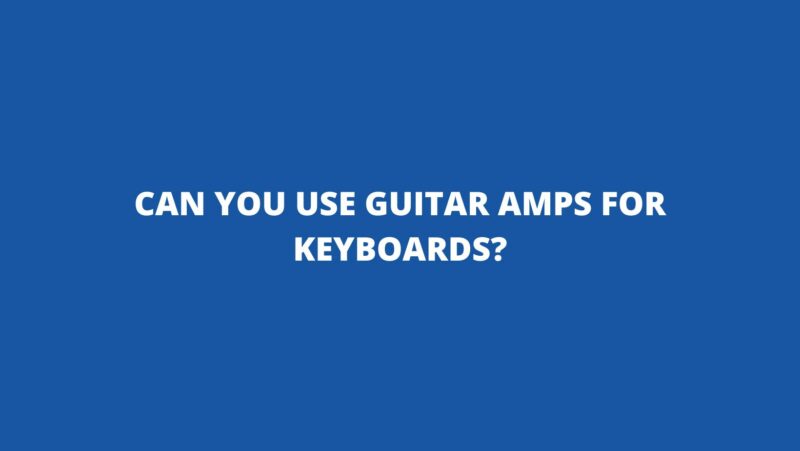The world of music is a realm of constant exploration and innovation, often blurring the lines between instruments and their applications. One intriguing question that arises is whether guitar amplifiers can effectively serve the needs of keyboard players. While guitar amplifiers are renowned for their distinct tonal characteristics and effects, using them for keyboards raises important considerations. This article delves into the practice of using guitar amps for keyboards, examining the benefits, limitations, and potential sonic outcomes of this unconventional pairing.
Understanding Guitar Amplifiers:
Guitar amplifiers have long been the backbone of electric guitar performances, offering a platform for musicians to shape their sound through tone controls, effects, and various amplifier settings. These amps are engineered to emphasize the tonal qualities of electric guitars, enhancing their inherent characteristics such as sustain, harmonics, and overtones.
Keyboard Amplification Needs:
Keyboards, often associated with digital pianos, synthesizers, and MIDI controllers, have become indispensable tools in music production, live performances, and studio work. While many keyboards come equipped with built-in speakers, the need for dedicated amplification arises when playing in larger venues, collaborating with other musicians, or aiming for a more expansive sound.
Can Guitar Amps Serve Keyboards?
The feasibility of using a guitar amplifier for a keyboard is a topic that merits exploration, as both instruments have distinct audio characteristics and different technical requirements. Below, we dissect the factors that influence the decision to use a guitar amp for keyboards:
1. Frequency Range:
Guitar amps are tailored to emphasize the midrange frequencies that define the guitar’s signature sound. Keyboards, on the other hand, span a broader frequency range, encompassing deep bass tones and shimmering highs. Using a guitar amp for a keyboard might result in a tonal imbalance, as the amp’s inherent design might not effectively reproduce the full spectrum of keyboard sounds.
2. Sonic Coloration:
One of the distinguishing features of guitar amplifiers is their capacity to color the sound in unique ways, contributing to the overall character of the guitar’s output. While this coloration is desirable for guitars, it might not be as well-suited for keyboards, which often aim for a transparent and faithful representation of their inherent sounds. Employing a guitar amp could alter the timbre of keyboard tones, leading to unintended sonic outcomes.
3. Effects Compatibility:
Keyboards often incorporate a variety of built-in effects or are paired with external effects processors to enhance their sonic versatility. Guitar amplifiers are typically designed with guitar pedals in mind, and while some effects might work well with keyboards, the overall compatibility could be limited. This may restrict the range and quality of effects available to keyboard players.
4. Power Handling:
Keyboards often require higher power handling than guitars due to their wider frequency range and the need for clean reproduction, especially at higher volumes. Guitar amps might lack the necessary power handling capacity to adequately amplify keyboard sounds, resulting in distortion and potential damage to the amplifier.
5. Speaker Configuration:
Guitar amplifiers are engineered with specific speaker configurations optimized for guitars. Keyboards, however, benefit from a full-range speaker setup to accurately reproduce the diverse sounds they generate. Using a guitar amp with a limited speaker configuration could compromise the authenticity and integrity of keyboard sounds.
Benefits of Using Guitar Amps for Keyboards:
While using a guitar amp for keyboards poses challenges, there are situations where this unconventional combination might yield intriguing results:
1. Creative Sound Shaping:
The unique coloration and tonal characteristics of guitar amps could add a creative dimension to keyboard sounds, creating new sonic textures and possibilities.
2. Intentional Distortion:
In certain genres, intentional distortion can be used creatively to achieve specific effects or moods. Using a guitar amp might facilitate this type of sonic experimentation.
3. Limitation as Inspiration:
Limitations can often inspire unique solutions. Musicians seeking a specific lo-fi or vintage sound might find that the characteristics of a guitar amp add a desirable layer of authenticity to their keyboard performance.
Conclusion:
The question of whether guitar amplifiers can effectively serve the needs of keyboard players doesn’t have a straightforward answer. While it’s technically possible to connect a keyboard to a guitar amp, there are several factors to consider. The distinct frequency range, sonic coloration, effects compatibility, power handling, and speaker configuration of both instruments play vital roles in determining the viability of this pairing.
For experimental or creative endeavors, connecting a keyboard to a guitar amp might lead to intriguing sonic outcomes. However, for professional performances, recording sessions, or when aiming for a transparent and accurate representation of keyboard sounds, it’s recommended to invest in a dedicated keyboard amplifier or a PA system designed to handle the complexities of keyboard frequencies.
Ultimately, the decision to use a guitar amp for a keyboard depends on the musician’s goals, the desired sonic qualities, and the context in which the instrument will be played. As technology evolves, creative sound exploration continues, and musicians push the boundaries of convention, we can expect to see new and innovative approaches to amplification that bridge the gap between different instruments and their amplification solutions.


